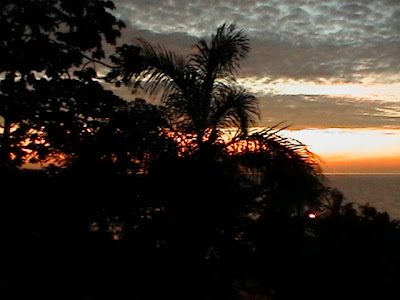
My morning visitor. There are a couple different lizards that hang out around my sink, and I have as many as ten geckos running around the walls, chirping like birds. I get an occasional bird in the apartment as well...
Every morning at 6 am, the Catholic church bells 100 yards from my bed ring. They ring again 15 minutes later, and shortly thereafter I can hear the gentle sounds of morning mass.
This morning a gorgeous sunrise woke me up before the bells, and the Sea invited me to swim. I like to go straight out from the shore, go as far as I feel safe, and then head back. If I go too far I fear the boats might not be looking for people in the water, so I limit myself to about 500 yards.
From out there you get a good view of the jungle to the south of town. Next time I'll start swimming from the southern end of town, go out a few hundred yards and then continue south, and get an even better look at the wild land.
A few days ago I walked several miles down the road to Boom Creek, which goes through mostly uninhabited land. I saw several flocks of parakeets and heard strange roaring sounds in the distance.
There isn't much to do in town. Recently I got invited into Paul's house where he and Hector were sitting in the doorway drinking rum mixed with water. Paul is 65 and lives apart from his wife and kids. He showed me their report cards. The two girls were doing well, but the boy, in 4th grade, is not much of a scholar. He failed everything.
They convinced me to cough up $2.50 for another bottle, and gave me a new plastic cup to drink from. That was good because Paul's house is pretty grimy -- I don't think I would have wanted to drink from one of his cups. I don't think he has a toilet in the house. Half of his house is hidden from the road by another small house that sits very close to it, and both he and Hector urinated in the strip of land between the houses several times. There were lots of flies and mosquitoes in the doorway.
We talked about Garifuna culture. Paul insists he is not Garifuna, but Carib. He claims to be the only Carib here, and that his Carib grandfather was blond, looked like a German, to which Hector agreed. Paul is very black.
It turns out I met Hector last summer. I was walking to town and he struck up a conversation. He told me he had lived in Arizona, in Nogales, Eloy, and Phoenix, and convinced me to buy him a pound of beans. We both remembered that.
Two of his children showed up at the door. I didn't catch much of the conversation as it was in Creole (Pidgin English). Hector asked me to give his kids 50 cents so they could get something to eat.
He speaks English, Spanish, Creole and Garifuna. He works about three days a month, for the city, general labor. I asked Paul what he did to earn money to buy food. He looked at me for a long time through his bloodshot eyes. "That is a good question..."

















